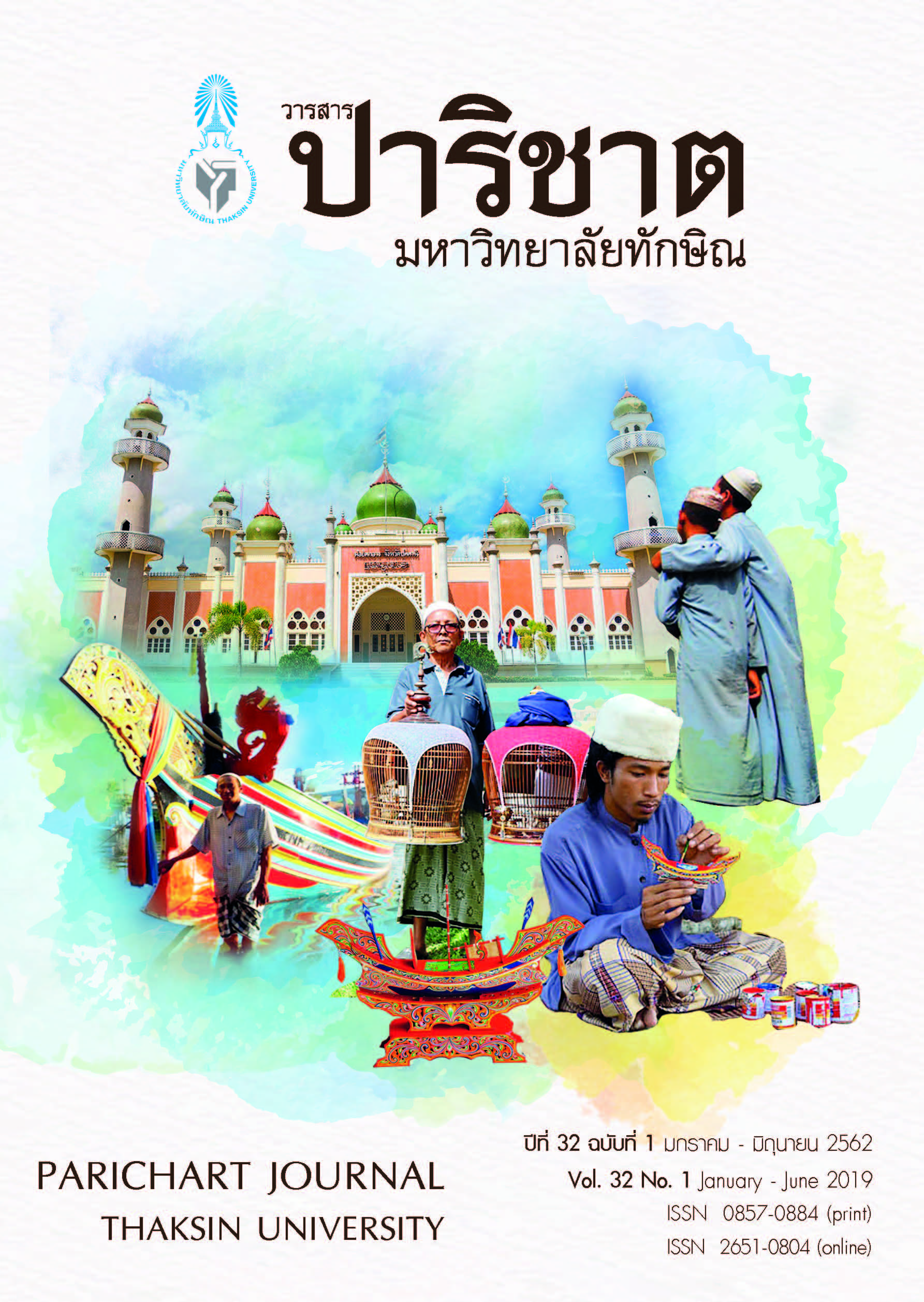Action Research on Maintaining Islamic Way of Behavior of Youth in the Three Southern Border Provinces: A Case Study of Sarong Village, Yarang Sub-district, Khotoom District, Pattani Province
Main Article Content
Abstract
This action research was both qualitative and quantitative methods, which aimed to investigate the problem and the results of promoting Islamic way behavior among youth in Ban Sarong, Khao Tum Sub- district, Yarang District, Pattani Province. Qualitative data were collected from a discussion forum and focus group. Ten representatives were selected to represent local people, religious groups, youth leaders, and parents. The data were analyzed using content analysis. Quantitative data were collected from 70 youth involved to action performed according to plan. The data were analyzed using independent samples ttest and paired samples t-test. The research findings revealed that 1) most Muslim leaders recognized and assigned importance to promoting youth behavior in accordance with the Islamic way of life; however, the leaders lacked knowledge and understanding of the youth. The youth did not see the importance of the behavior being promoted and as a result did not put attention to the activities. As a result, the promotion of behaviors in accordance with the Islamic way of life was not successful. Moreover, 2) the youths in the experimental group who participated in activities organized by the Sarong Conservation Club had a significantly higher level of Islamic way behavior than those in the control group who participated in activities organized by the mosque at .01.
Article Details
References
Anmunajid, S. (2004). Prohibited relationships. Retrieved on February 19, 2014, from https://www.majlis-ilmi.org/islam/modules.php? op=modload&name=Sections&file=index&req=viewarticl&artid=1&page =1.
Laeheem, K., & Baka, D. (2010). A study of the Thai Muslim youth’s way of life to maintaining peace in the three southern border provinces of Thailand. Songklanakarin Journal of Social Sciences and Humanities, 16(6), 973–988.
Annadwee, A. ( 2004) . Dear Muslim Intellectuals. Retrieved on February 19, 2014, from https://www.majlis-ilmi.org/slam/modules.php?op=modload&name=Sections&file=index&req=viewarticle&artid =8&page=1.
Mahama, M. (2009). Islam: Way of life. Songkhla: Po-bard.
Laeheem, K. (2014). Factors associated with Islamic behavior among Thai Muslim youth in the three southern border provinces, Thailand. Kasetsart Journal: Social Sciences, 35(2), 356–367.
Laeheem, K. (2013). Reception of behavior supervision based on Islamic belief among Muslim adolescents in the three southern border provinces, Thailand. Kasetsart Journal: Social Sciences, 34(2), 323–334.
Baka, D. (2007). Masjid: Economic basic and cultural capital. Pattani: Prince of Songkla University.
Khagphong, P. (2004). Islamic faith on behavior of child breeding of Thai Muslim family in Bangkok (Unpublished master’ s thesis). Pattani: Prince of Songkla University.
Laeheem, K. (2012). Youth supervision based on the Islamic beliefs of Muslim leaders in three southern province communities. Kasetsart Journal: Social Sciences, 33(3), 454–463.
Laeheem, K. (2013). The Islamic way of youth care by Muslim leaders in the three southern border provinces of Thailand. Asian Social Science, 9(10), 160–168.
Laeheem, K., Baka, D., Tahe, H., & Walee, S. (2015). The results of Islamic behavior promotion through a “ Village Youth Club” among youth in Ban Sarong, Khao Tum sub- district, Yarang district, Pattani province. Asian Social Science, 11(5), 80–90.
Satsangan, N. (2000). The principle of cultural anthropology (4th Ed.). Bangkok: Rama Printing.
Sengpracha, N. (1998). Human and society (4th Ed.). Bangkok: O. S. Printing House.
Narongraksakhet, I. (1997). History of Islamic education. Pattani: Prince of Songkla University.
Laeheem, K., & Madreh, A. (2014). Youth supervision based on Islam provided by Muslim leaders in southern Thailand. Kasetsart Journal: Social Science, 35(1), 92–102.
Tahe, H., & Laeheem, K. (2013). The causes of reduction of the role in youth management according to the Islamic way among Muslim leaders in the three southern border provinces. Asian Social Science, 9(17), 135–143.
Tansakul, P. (2004). Why teams do not work. Bangkok: Jit Jakawarn.
Mapobsuk, W. (2000). Human relations. Bangkok: Se-Education.
Spector, E. (2006). Industrial organizational psychology: Research and practice (4th Ed.). New York: Willey
DeLamater, J. D., & Myyers, D. J. (2007). Social psychology (6th Ed.). Belmont, CA: Tomson/Wadsworth.
Thitiwattana, P. (2004). Human and sociology. Bangkok: Kasetsart University.
Sereetrakul, W. (2009). Factors affecting family solidarity in the opinions of Thai teenagers (Unpublished doctoral dissertation). Bangkok: Ramkhamhaeng University.


